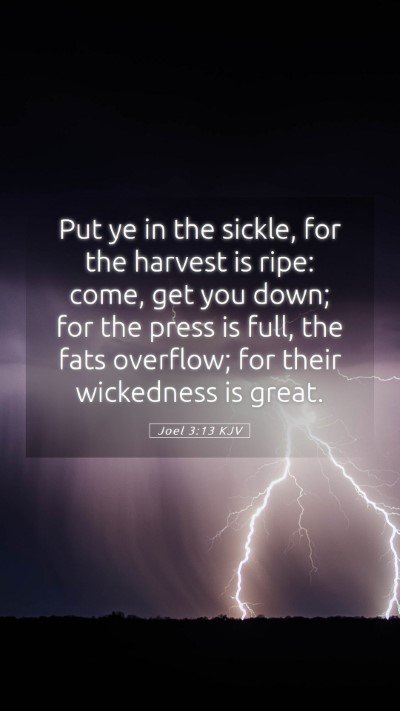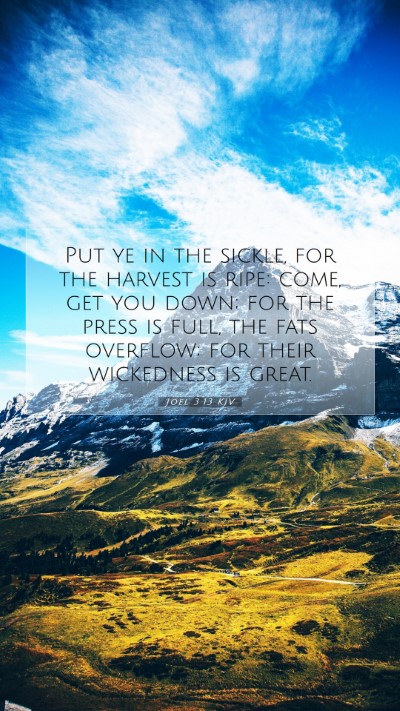Old Testament
Genesis Exodus Leviticus Numbers Deuteronomy Joshua Judges Ruth 1 Samuel 2 Samuel 1 Kings 2 Kings 1 Chronicles 2 Chronicles Ezra Nehemiah Esther Job Psalms Proverbs Ecclesiastes Song of Solomon Isaiah Jeremiah Lamentations Ezekiel Daniel Hosea Joel Amos Obadiah Jonah Micah Nahum Habakkuk Zephaniah Haggai Zechariah MalachiJoel 3:13 Meaning
What is the meaning of Joel 3:13?
Put ye in the sickle, for the harvest is ripe: come, get you down; for the press is full, the fats overflow; for their wickedness is great.
Joel 3:13 Bible Verse Meaning
Bible Verse Commentary: Joel 3:13
Verse Reference: Joel 3:13 - "Put ye in the sickle, for the harvest is ripe: come, get you down; for the press is full, the fats overflow; for their wickedness is great."
Overview of Joel 3:13
This verse appears in the prophetic book of Joel, which primarily addresses themes of judgment and restoration. In this context, Joel 3:13 utilizes agricultural imagery to convey profound spiritual truths about divine judgment and the consequences of moral decay. The imagery of harvesting and pressing is indicative of both the reaping of souls and the impending judgment upon the nations for their sins.
Meaning of the Verse
In Joel 3:13, the command to "put ye in the sickle" signifies a call to action—a divine decree that the time for judgment has come. Scholars and commentaries provide detailed insights into this verse:
- Matthew Henry's Commentary:
Henry emphasizes that the phrase "the harvest is ripe" implies the fullness of sin reaching a tipping point, warranting divine intervention. Just as a physical harvest yields ripe crops, the spiritual harvest indicates a time for retribution for the nations' iniquities.
- Albert Barnes' Notes:
Barnes interprets the sickle as a symbol of God's judgment, suggesting that as the sickle is used for gathering crops, so too will God gather the tares for burning. He articulates that the "press" represents the measure of iniquities that have amassed and are ready for judgment, denoting that the time has come for God to act.
- Adam Clarke's Commentary:
Clarke provides a historical context, explaining that the call to gather for pressing indicates the judgment not only on Israel's enemies but also a reminder of their call to repentance. His view illustrates the duality within the verse—the call for punishment and the potential for redemption through acknowledgment of sins.
Biblical Context
The background of Joel's prophecy situates it in times of impending judgment against Israel's adversaries. This context underscores the urgency portrayed in Joel 3:13, where the agricultural metaphor becomes a powerful vehicle to communicate God's displeasure with sin.
Application of the Verse
For modern readers seeking Bible verse meanings and understanding Scripture, Joel 3:13 serves as a potent reminder of the gravity of sin and divine accountability. Applying this verse to daily life involves recognizing the importance of cultivating a spiritual life that bears good fruit and avoids the traps of wickedness. The call to harvest serves as a metaphor for both outreach to others and self-examination in one’s own spiritual journey.
Cross References
The following cross-references provide additional insights related to Joel 3:13:
- Revelation 14:15: "And another angel came out of the temple, crying with a loud voice to him that sat on the cloud, Thrust in thy sickle and reap: for the time is come for thee to reap; for the harvest of the earth is ripe."
- Matthew 13:39: "The enemy that sowed them is the devil; the harvest is the end of the world; and the reapers are the angels."
- Galatians 6:7: "Be not deceived; God is not mocked: for whatsoever a man soweth, that shall he also reap."
Conclusion
Joel 3:13 encapsulates a crucial biblical message about the balance of divine justice and personal accountability. Understanding this verse through Bible study tools and scripture analysis reveals insights that are applicable across generations. As believers engage in Bible study groups or online Bible study, they can explore the profound implications of this prophetic call, ensuring that they are not only aware of the judgment to come but also engaged in a life that reflects God's righteousness.


